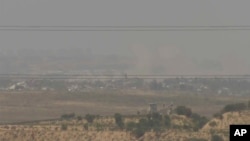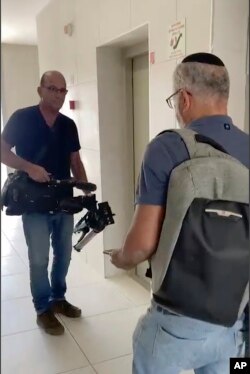Israel’s communications minister ordered the return of seized camera equipment to The Associated Press after blocking the news outlet’s live video feed of Gaza earlier on Tuesday.
The reversal comes after press freedom groups, the U.S. government and the United Nations condemned the incident as a press freedom violation.
Israeli officials seized a camera and broadcasting equipment belonging to the AP in southern Israel, accusing the AP of violating Israel’s new foreign broadcaster law, including a ban on Al Jazeera.
Al Jazeera is among the thousands of clients who receive live video feeds from the AP, the outlet said.
Press freedom groups, the U.S. government and the United Nations expressed concern about the incident. The AP called on the Israeli government to reverse the action.
“The Associated Press decries in the strongest terms the actions of the Israeli government to shut down our longstanding live feed showing a view into Gaza and seize AP equipment,” AP Vice President of Corporate Communications Lauren Easton said in a statement.
“The shutdown was not based on the content of the feed but rather an abusive use by the Israeli government of the country’s new foreign broadcaster law,” Eaton continued. “We urge the Israeli authorities to return our equipment and enable us to reinstate our live feed immediately so we can continue to provide this important visual journalism to thousands of media outlets around the world.”
On Tuesday afternoon, officials from Israel’s Communications Ministry arrived at the AP location in the southern Israeli town of Sderot and seized the equipment, according to the AP. The officials gave the AP a piece of paper that was signed by Communications Minister Shlomo Karhi and alleged the AP was breaking Israel’s new foreign broadcaster law.
Karhi is the minister who later ordered the seized equipment be returned to the AP.
That new foreign broadcaster law allows the Israeli government to temporarily shut down foreign news outlets viewed as threatening state security. Israel used the law to shut down Al Jazeera earlier in May, a move that was widely condemned by press freedom groups.
The AP was broadcasting a general view of northern Gaza shortly before the equipment was seized.
The seizure came after a verbal order last week to cease the live transmission of Gaza, which the AP did not comply with.
“In accordance with the government decision and the instruction of the communications minister, the communications ministry will continue to take whatever enforcement action is required to limit broadcasts that harm the security of the state,” the ministry said in a statement, according to the AP.
The Foreign Press Association in Jerusalem expressed concern in a statement that the incident “could allow Israel to block media coverage of virtually any news event on vague security grounds.”
Israel’s opposition leader, Yair Lapid, called the act against the AP “an act of madness.”
The National Press Club in Washington also condemned the incident.
“There was no strategic reason for these actions, which are part of a pattern of aggression against journalism organizations by Israel,” National Press Club President Emily Wilkins said in a statement.
“The lengths to which Israel is willing to go to stop news coverage of the military action in Gaza must not be overlooked by the media still covering the conflict and the public at large,” she said.
Reporters Without Borders, meanwhile, decried the incident as “scandalous censorship.”
The U.S. government has also expressed concern about the move. White House Press Secretary Karine Jean-Pierre told reporters on President Joe Biden’s plane that “obviously this is concerning, and we want to look into it.”
Stephane Dujarric, spokesperson for the U.N. secretary-general, called the incident “quite shocking.”
“Journalists need to be able to do their work freely. The Associated Press, of all news organizations, should be allowed to do its work freely and free of any harassment,” Dujarric told reporters.
The move comes amid the ongoing war between Israel and Hamas, which was sparked on October 7 when Hamas attacked southern Israel, killing 1,200 people and taking 250 hostages. More than 35,000 Palestinians have been killed since then, according to the Gaza Health Ministry, which doesn’t distinguish between civilians and combatants in its count.
The war has proven particularly deadly for journalists. As of May 21, 105 journalists have been killed since the war began, including 100 Palestinians, two Israelis and three Lebanese, according to the Committee to Protect Journalists.
Some information in this report came from The Associated Press and Reuters.

